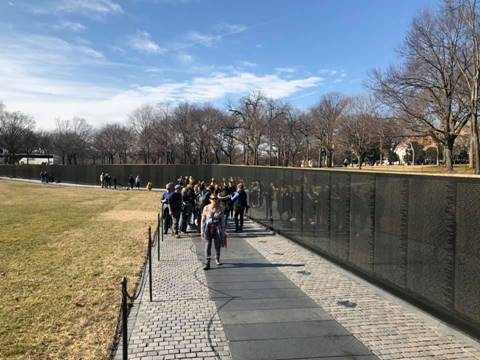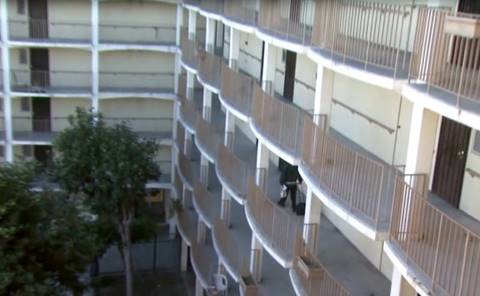|
| I made a quick trip to Washington D.C. Thursday and Friday to meet with HUD to try and facilitate assistance needed to “transition” the agency to a model now favored by HUD. I met with Donald “DJ” LaVoy, Deputy Assistant Secretary (REAC) to pitch two requests, (1) Section 8 vouchers to help make the rehabilitation of Hacienda financially feasible, and (2) technical assistance to move our Section 8 voucher program to the Housing Authority of Contra Costa County (HACCC).
The trip was a success in that I got a firm commitment for the technical assistance and a promise to at least work on the Hacienda financing package.
It was a beautiful warm spring day, and I had a few extra hours, so I visited the Vietnam Veterans Memorial and the National Museum of African American History.

Vietnam Veterans Memorial

National Museum of African American History
The Richmond Housing Authority (RHA) and HUD have entered into a Public Housing Authority Recovery and Sustainability PHARS) Agreement intended to resolve all lingering issues. Two of the RHA properties (Triangle Court and Friendship Manor) have already transitioned to private sector managers through the Rental Assistance Demonstration (RAD) program.
Richmond Village is already privatized, managed by McCormick Baron as part of the former Hope VI Easter Hill reposition project.
That leaves Nystrom Village (100 units), Nevin Plaza (142 units), and Hacienda.(formerly 148 units) to be transitioned. Hacienda is vacant, with rehabilitation anticipated through an agreement with Mercy Housing. The City is currently spending $500,000 a year just to secure the vacant building.
RHA has an allocation of 2,004 Section 8 vouchers that provide a monthly rental subsidy of approximately $22 million for seniors, disabled, families and others who reside in privately-owned rental units. The plan is to turn over management of these Section 8 vouchers to the HACCC. RHA continues to lose money managing the Section 8 program.
The story below is from https://www.kqed.org/news/11710655/richmond-looks-to-get-out-of-managing-its-low-income-housing.
Richmond Looks to Get Out of Managing Its Low-Income Housing
The Hacienda high-rise is one of Richmond's five public housing projects. From 2012-2013, there were at least 16 life-threatening health and safety violations at the five projects, according to U.S. Department of Housing and Urban Development reports. (KQED News/YouTube)
Richmond will search for outside public and private partners to manage its low-income housing properties and Section 8 voucher programs, the City Council decided this week.
Faced with major financial and operational challenges and ongoing federal budget cuts, the Richmond Housing Authority has long struggled to meet the basic needs of its tenants, many of whom are elderly and physically impaired.
The city has been forced in recent years to dip into its general fund — to the tune of about $7 million — to prop up the ailing agency.
"The city of Richmond has been put in the position of having to subsidize it," Richmond Mayor Tom Butt said. "That's not sustainable and it's just going to get worse."
The Housing Authority did not respond to a request for comment.
In Richmond, some of the poorest, oldest and most vulnerable people in the Bay Area have lived in recent years in squalor and fear due to the housing agency’s mismanagement and neglect, the Center for Investigative Reporting found in a 2014 report.
The city has yet to decide on new partners, although the Contra Costa County Housing Authority has emerged as one possible white knight. The county housing agency could step in to oversee Richmond's Section 8 program, which provides rental vouchers to low-income tenants.
As part of the handoff process, Richmond plans to sell off its six public housing developments, Butt said. Management of them, he said, would be transferred to various private affordable housing developers.
"We're certainly willing to speak with the city if they ask us," said Joseph Villarreal, director of the Contra Costa County Housing Authority.
He noted that Richmond's problems are certainly not unique: His agency recently took over the management of low-income housing programs in nearby San Pablo.
"Because of federal funding continuing to dry up, you have seen housing authorities basically close their doors," he said.
Housing advocates in Richmond are cautiously optimistic about the planned transfer of responsibility.
"I think it depends on the implementation and the transition strategy," said Nikki Beasley, director of the nonprofit Richmond Neighborhood Housing Services.
"We would love to see the housing authority continue to perform in Richmond because there's a large population of residents that are reliant on (it). However, if it's not sustainable, we just want to make sure that the transitional plan does not negatively impact the residents."
|

